History has accelerated; the impossible has become possible. Shifts that no one imagined two weeks ago are unfolding with incredible speed, notes Anne Applebaum, the author of Twilight of Democracy: The Seductive Lure of Authoritarianism.
As it turns out, nations are not pieces in a game of Risk. They do not, as some academics have long imagined, have eternal interests or permanent geopolitical orientations, fixed motivations or predictable goals. Nor do human beings always react the way they are supposed to react, she writes for The Atlantic:
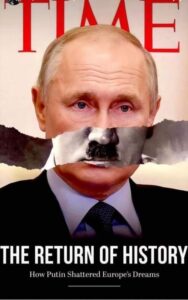 Last week, nobody who was analyzing the coming war in Ukraine imagined that the personal bravery of the Ukrainian president and his emotive calls for sovereignty and democracy could alter the calculations of foreign ministers, bank directors, business executives, and thousands of ordinary people. Few imagined that the Russian president’s sinister television appearances and brutal orders could alter, in just a few days, international perceptions of Russia.
Last week, nobody who was analyzing the coming war in Ukraine imagined that the personal bravery of the Ukrainian president and his emotive calls for sovereignty and democracy could alter the calculations of foreign ministers, bank directors, business executives, and thousands of ordinary people. Few imagined that the Russian president’s sinister television appearances and brutal orders could alter, in just a few days, international perceptions of Russia.
And yet all of that has happened, adds Applebaum, a board member of the National Endowment for Democracy (NED). Volodymyr Zelensky’s courage has moved people, even the hard-bitten CEOs of oil companies, even dull diplomats accustomed to rote pronouncements.
Nobody imagined that Zelensky’s personal bravery & emotive calls for sovereignty & democracy would alter the calculations of foreign ministers, bank directors, business execs, & thousands of ordinary people, @NEDemocracy‘s @AnneApplebaum in @TheAtlantic https://t.co/M4MfW8jznD
— Democracy Digest (@demdigest) March 2, 2022
Western governments and civil society groups have joined Mykhailo Fedorov (below), one of Ukraine’s deputy prime ministers, in escalating pressure on the tech giants to address Russian information operations. The ultimate goal is to help win the war by turning world opinion and that of Russia’s own people against Putin and his government, according to The Washington Post’s Cat Zakrzewski and Gerrit De Vynck.
 “Make the Russian business community and regular Russians feel what we feel,” his deputy Alex Bornyakov said. “If everything is fine in Russia, people won’t start asking questions. But when big platforms and the whole civil world, civil society will start to act, this will be a signal to them that their government actions are unacceptable.”
“Make the Russian business community and regular Russians feel what we feel,” his deputy Alex Bornyakov said. “If everything is fine in Russia, people won’t start asking questions. But when big platforms and the whole civil world, civil society will start to act, this will be a signal to them that their government actions are unacceptable.”
 The regime’s brazen poisoning of Russian opposition leader Alexei Navalny and banning of Memorial, the country’s most important post-Soviet human rights civic institution underscore the regime’s commitment to using repression to maintain control, note analysts Andrea Kendall-Taylor and Erica Frantz.
The regime’s brazen poisoning of Russian opposition leader Alexei Navalny and banning of Memorial, the country’s most important post-Soviet human rights civic institution underscore the regime’s commitment to using repression to maintain control, note analysts Andrea Kendall-Taylor and Erica Frantz.
Russians have gotten the message, they write for Foreign Affairs:
According to polling by the Levada Center in 2021, 52 percent of Russians fear mass repression, and 58 percent are scared they will be arbitrarily arrested or otherwise harmed by the authorities—the highest these indicators have been since 1994. Such an uptick in repression is common late in the tenures of longtime autocrats. The longer these authoritarians remain in power, the more they lose touch with their societies and the less they have to offer their citizens. As a result, they have few other ways to sustain their rule.
I have to hope that at this very moment there are some very senior Russian intelligence and military officials, close to Putin, who are meeting in some closet in the Kremlin and saying out loud what they all must be thinking, Thomas Friedman writes for The New York Times: Either Putin has lost a step as a strategist during his isolation in the pandemic or he is in deep denial over how badly he has miscalculated the strength of Ukrainians, America, its allies and global civil society at large.
The democracies’ unprecedented “energetic unity” in responding to the invasion does suggest that there is scope for what NED President and CEO Damon Wilson called a new “generational movement” to enhance democratic resilience by expunging kleptocracy from the West’s political and financial architecture.
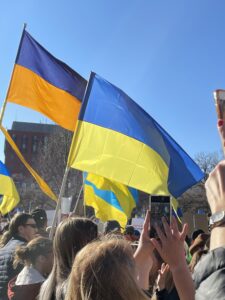 The country’s robust civil society is the secret to Ukraine’s resistance, Orysia Hrudka writes for EuroMaidan Press. Ukrainians have learned from history.
The country’s robust civil society is the secret to Ukraine’s resistance, Orysia Hrudka writes for EuroMaidan Press. Ukrainians have learned from history.
“I often think about people who were here before me,” journalist Tetiana Teren states in the video of PEN Ukraine (above) published on the first day of the invasion. “Unfortunately in our recent past, the Soviet totalitarian period, thousands of my colleagues were subjected to censorship, repressed, and executed. That’s why now when we work we do so twice or thrice as hard, thinking of those who were here before us and who could not do it.”
Putin’s threat of a nuclear attack “has put Russia on the brink of a future collapse,” says a prominent Ukrainian activist.
“It probably says that Putin is desperate that his non-nuclear force has somewhat failed, so he has to threaten the whole world with the nukes,” said Ostap Kryvdyk, an activist and former advisor to Ukrainian Parliament’s speaker.
“It might sound fantastic as of now, but the Soviet Union didn’t really fully collapse yet. What we are witnessing is something like Milosevic did when former Yugoslavia collapsed, he tried to recollect it back and he failed badly. “That is what is happening with Russia right now.”
“I think with the nuclear blackmail, Putin has put Russia on the brink of a future collapse, so Russian statehood may collapse,” he said.
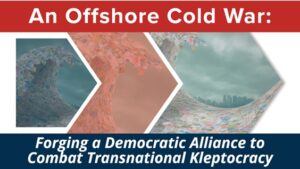 The Russian kleptocrat is trying to blackmail the West to force Ukraine to surrender, Kryvdyk added, but he is “convinced that those leaders of the free world will not do that. They will not force the weaker to capitulate to the stronger.”
The Russian kleptocrat is trying to blackmail the West to force Ukraine to surrender, Kryvdyk added, but he is “convinced that those leaders of the free world will not do that. They will not force the weaker to capitulate to the stronger.”
Putin’s aggression has exposed the delusions of those who, through ideology or naivety, were happy to do business with, aid, and rely upon Russia’s energy exports, says a leading analyst.
Russia’s assault — its duplicity, its scale, and its brutality — was for Europeans a shock of an even greater magnitude than the attacks of Sept. 11, 2001, notes Jean-Baptiste Jeangene Vilmer, Ph.D., the director of the Institute for Strategic Research (IRSEM) at the French Ministry of the Armed Forces, and a nonresident senior fellow at the Europe Center of the Atlantic Council. The shock had and will have several effects, he writes for War on the Rocks:
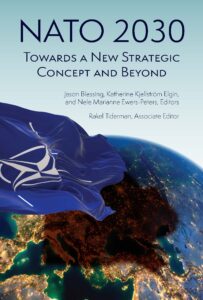 First, it immediately reinforced the raison d’être of the NATO alliance which, since the dissolution of the Warsaw Pact against which it was directed, had gone through several existential crises. The war in Ukraine put an end to the metaphysical questions that some people might have had about the relevance or interest of NATO today, by clearly demonstrating a common and imperial threat. The war also strengthened the cohesion of NATO, which for the first time in its history activated its rapid reaction force, first planned at the Prague summit in 2002.
First, it immediately reinforced the raison d’être of the NATO alliance which, since the dissolution of the Warsaw Pact against which it was directed, had gone through several existential crises. The war in Ukraine put an end to the metaphysical questions that some people might have had about the relevance or interest of NATO today, by clearly demonstrating a common and imperial threat. The war also strengthened the cohesion of NATO, which for the first time in its history activated its rapid reaction force, first planned at the Prague summit in 2002.- Second, this shock will also go down in history as marking the true emergence of the European Union as a geopolitical power. European countries have been struggling for years to build cohesion and ambition on defense. Putin made it happen in three days. On Feb. 27, the bloc agreed to “finance the purchase and delivery of weapons and other equipment to a country that is under attack.” Those who, through ideology or naivety, were happy to do business with, aid, and rely upon the energy exports of Russia have seen their delusions exposed. ….
- Finally, this shock has also considerably strengthened NATO’s attractiveness, since this war is a demonstration of the risk of not being part of it. It will have immediate consequences for countries like Sweden and Finland. The Russian invasion of Ukraine will “change” the national debate on NATO membership, as the Finnish prime minister said on the first day of the offensive. And she was right: Only a couple of days later, a poll showed that a majority of Finns are now in favor of joining NATO.
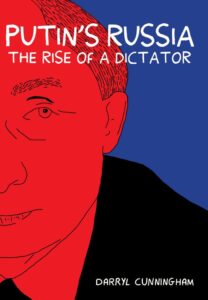 The logical conclusion of all this is that the resentment and hostility and fear that Putin generates within the Russian elite constitutes a real risk for his maintenance in power in the coming weeks, months, and years, Vilmer adds. The probability of a palace coup or an oligarchic revolt is substantial. There may come a point where it appears to the population and the economic, military, and security elite, including within the Kremlin, that the only way to save Russia is to get rid of Putin. This war is his greatest error of judgement and could be “the beginning of the end” — his end.
The logical conclusion of all this is that the resentment and hostility and fear that Putin generates within the Russian elite constitutes a real risk for his maintenance in power in the coming weeks, months, and years, Vilmer adds. The probability of a palace coup or an oligarchic revolt is substantial. There may come a point where it appears to the population and the economic, military, and security elite, including within the Kremlin, that the only way to save Russia is to get rid of Putin. This war is his greatest error of judgement and could be “the beginning of the end” — his end.
‘Grand strategic mistake’
It is clear that Putin’s invasion was based on delusions about Ukraine, the West and Russia, says Nigel Gould-Davies, Whatever the outcome on the battlefield, he has unleashed forces that weaken his country’s, and his own, position, he writes for The Moscow Times:
- Firstly, Putin drastically underestimated Ukraine’s cohesion and will to resist. When he declared war, he called on Ukrainian forces to lay down their arms. … Putin is inadvertently completing the work he began in 2014 of uniting Ukrainian society and reinforcing its national identity.
- Secondly, Putin badly underestimated Western cohesion and resolve. Russia now faces a range of sanctions never inflicted on a major economy, notably the freezing of central bank assets….And Western unity extends across societies, as well as states. No significant body of opinion is sympathetic to Russia. Private organisations and companies are adding their own sporting and cultural restrictions to government sanctions….
- Thirdly, Putin underestimated domestic opposition. His war against fellow Slavs is the most unpopular decision he has ever made. The stated aims – to ‘denazify’ a country with a democratically elected Jewish president, and to stop a ‘genocide’ that does not exist – lack credibility. Despite a severely repressed civil society, demonstrations began on the first day of the invasion, with 3,000 arrests made already….
- More significantly, Russian elites are disquieted. Anxiety radiated from senior government figures whom Putin browbeat and humiliated at an extraordinary televised meeting of the Security Council on 21 February. Several celebrities have expressed their opposition to the war. The tsunami of sanctions will hurt the entire business class, not only the oligarchs who have begun to signal their unease. All this matters because war is a contest of wills, as well as of arms…..
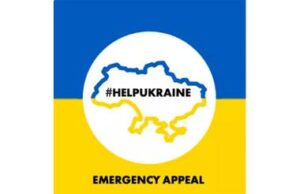 The invasion is emerging as a grand strategic mistake, adds . As Ukraine’s resistance, Russia’s international isolation and Putin’s isolation within Russia all deepen, the Kremlin suddenly finds itself much weaker on every political front.
The invasion is emerging as a grand strategic mistake, adds . As Ukraine’s resistance, Russia’s international isolation and Putin’s isolation within Russia all deepen, the Kremlin suddenly finds itself much weaker on every political front.
“This seems to be the beginning of the most difficult period in generations,” said Bogdan Aurescu, Romania’s Minister of Foreign Affairs. “And this is the fight of our generation and a real test on our democracies,” he told an Emergency Governing Council Meeting of the Community of Democracies (CoD), convened to discuss solidarity in a time of war on democracy.
Tenuous grip on power
Predicting the downfall of an authoritarian leader is a fool’s errand. Weak and embattled autocrats can limp along far longer than analysts expect, analysts Kendall-Taylor and Frantz observe. But analysts do know that personalist leaders such as Putin are more likely to make foreign policy mistakes than are other autocrats, they add in Foreign Affairs:
They surround themselves with yes men who only tell them what they want to hear and withhold bad news, making it difficult for these dictators to make well-informed decisions. Whether or not Putin’s war of choice becomes the mistake that unseats him from power is an open question. But Russia is experiencing rising dissatisfaction from the public, fissures among its elite, and broad-based international punishment. Putin’s downfall may not come tomorrow or the day after, but his grip on power is certainly more tenuous than it was before he invaded Ukraine.
Solidarity in a time of War on Democracy: Community of Democracies Governing Council meets in Emergency Session on #Ukraine
▶️ https://t.co/4ILkNHlDmJ@POLITICOEurope @AP @ForeignAffairs @euobs @EURACTIV @Reuters @demdigest @PAP_eng @euronews @politico pic.twitter.com/DTt8v8TZaO
— CoD (@CommunityofDem) March 2, 2022
There are plenty of reasons why Taiwan is not Ukraine, and why our Asian allies are different than our European ones, says RAND analyst Raphael S. Cohen (below). But the basic point remains—that if we sit back and allow authoritarian regimes to bully their smaller democratic neighbors into submission without repercussions, it will send a powerful signal to the rest of the world.
.@RANDCorporation‘s Raphael S. Cohen discusses the ‘underwhelming Russian military performance’ and ‘Europe’s robust response’ in the #UkraineRussiaWar pic.twitter.com/BBFFAoG9UV
— i24NEWS English (@i24NEWS_EN) March 2, 2022







